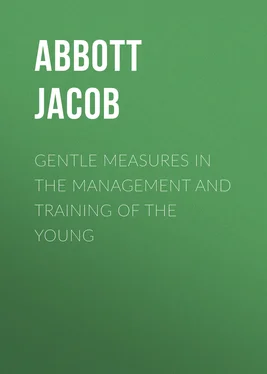Jacob Abbott - Gentle Measures in the Management and Training of the Young
Здесь есть возможность читать онлайн «Jacob Abbott - Gentle Measures in the Management and Training of the Young» — ознакомительный отрывок электронной книги совершенно бесплатно, а после прочтения отрывка купить полную версию. В некоторых случаях можно слушать аудио, скачать через торрент в формате fb2 и присутствует краткое содержание. Жанр: foreign_edu, pedagogy_book, upbringing_book, на английском языке. Описание произведения, (предисловие) а так же отзывы посетителей доступны на портале библиотеки ЛибКат.
- Название:Gentle Measures in the Management and Training of the Young
- Автор:
- Жанр:
- Год:неизвестен
- ISBN:нет данных
- Рейтинг книги:5 / 5. Голосов: 1
-
Избранное:Добавить в избранное
- Отзывы:
-
Ваша оценка:
- 100
- 1
- 2
- 3
- 4
- 5
Gentle Measures in the Management and Training of the Young: краткое содержание, описание и аннотация
Предлагаем к чтению аннотацию, описание, краткое содержание или предисловие (зависит от того, что написал сам автор книги «Gentle Measures in the Management and Training of the Young»). Если вы не нашли необходимую информацию о книге — напишите в комментариях, мы постараемся отыскать её.
Gentle Measures in the Management and Training of the Young — читать онлайн ознакомительный отрывок
Ниже представлен текст книги, разбитый по страницам. Система сохранения места последней прочитанной страницы, позволяет с удобством читать онлайн бесплатно книгу «Gentle Measures in the Management and Training of the Young», без необходимости каждый раз заново искать на чём Вы остановились. Поставьте закладку, и сможете в любой момент перейти на страницу, на которой закончили чтение.
Интервал:
Закладка:
If, besides being their playmate, their companion, and friend, indulgent in respect to all their harmless fancies, and patient and forbearing with their childish faults and foolishness, she also exercises in cases requiring it an authority over them which, though just and gentle, is yet absolute and supreme, she rises to a very exalted position in their view. Their affection for her has infused into it an element which greatly aggrandizes and ennobles it—an element somewhat analogous to that sentiment of lofty devotion which a loyal subject feels for his queen.
On the other hand, if she is inconsiderate enough to attempt to win a place in her children's hearts by the sacrifice of her maternal authority, she will never succeed in securing a place there that is worth possessing. The children will all, girls and boys alike, see and understand her weakness, and they will soon learn to look down upon her, instead of looking up to her, as they ought. As they grow older they will all become more and more unmanageable. The insubordination of the girls must generally be endured, but that of the boys will in time grow to be intolerable, and it will become necessary to send them away to school, or to adopt some other plan for ridding the house of their turbulence, and relieving the poor mother's heart of the insupportable burden she has to bear in finding herself contemned and trampled upon by her own children. In the earlier years of life the feeling entertained for their mother in such a case by the children is simply that of contempt; for the sentiment of gratitude which will modify it in time is very late to be developed, and has not yet begun to act. In later years, however, when the boys have become young men, this sentiment of gratitude begins to come in, but it only changes the contempt into pity. And when years have passed away, and the mother is perhaps in her grave, her sons think of her with a mingled feeling excited by the conjoined remembrance of her helpless imbecility and of her true maternal love, and say to each other, with a smile, "Poor dear mother! what a time she had of it trying to govern us boys!"
If a mother is willing to have her children thus regard her with contempt pure and simple while they are children, and with contempt transformed into pity by the infusion of a tardy sentiment of gratitude, when they are grown, she may try the plan of endeavoring to secure their love by indulging them without governing them. But if she sets her heart on being the object through life of their respectful love, she may indulge them as much as she pleases; but she must govern them.
A great deal is said sometimes about the evils of indulgence in the management of children; and so far as the condemnation refers only to indulgence in what is injurious or evil, it is doubtless very just. But the harm is not in the indulgence itself—that is, in the act of affording gratification to the child—but in the injurious or dangerous nature of the things indulged in. It seems to me that children are not generally indulged enough. They are thwarted and restrained in respect to the gratification of their harmless wishes a great deal too much. Indeed, as a general rule, the more that children are gratified in respect to their childish fancies and impulses, and even their caprices, when no evil or danger is to be apprehended, the better.
When, therefore, a child asks, "May I do this?" or, "May I do that?" the question for the mother to consider is not whether the thing proposed is a wise or a foolish thing to do—that is, whether it would be wise or foolish for her , if she, with her ideas and feelings, were in the place of the child—but only whether there is any harm or danger in it; and if not, she should give her ready and cordial consent.
There is no necessary antagonism, nor even any inconsistency, between the freest indulgence of children and the maintenance of the most absolute authority over them. Indeed, the authority can be most easily established in connection with great liberality of indulgence. At any rate, it will be very evident, on reflection, that the two principles do not stand at all in opposition to each other, as is often vaguely supposed. Children may be greatly indulged, and yet perfectly governed. On the other hand, they may be continually checked and thwarted, and their lives made miserable by a continued succession of vexations, restrictions, and refusals, and yet not be governed at all. An example will, however, best illustrate this.
A mother, going to the village by a path across the fields, proposed to her little daughter Louisa to go with her for a walk.
Louisa asked if she might invite her Cousin Mary to go too. "Yes," said her mother; "I think she is not at home; but you can go and see, if you like."
Louisa went to see, and returned in a few minutes, saying that Mary was not at home.
"Never mind," replied her mother; "it was polite in you to wish to invite her."
They set out upon the walk. Louisa runs hither and thither over the grass, returning continually to her mother to bring her flowers and curiosities. Her mother looks at them all, seems to approve of, and to sympathize in, Louisa's wonder and delight, and even points out new charms in the objects which she brings to her, that Louisa had not observed.
At length Louisa spied a butterfly.
"Mother," said she, "here's a butterfly. May I run and catch him?"
"You may try," said her mother.
Louisa ran till she was tired, and then came back to her mother, looking a little disappointed.
"I could not catch him, mother."
"Never mind," said her mother, "you had a good time trying, at any rate. Perhaps you will see another by-and-by. You may possibly see a bird, and you can try and see if you can catch him ."
So Louisa ran off to play again, satisfied and happy.
A little farther on a pretty tree was growing, not far from the path on one side. A short, half-decayed log lay at the foot of the tree, overtopped and nearly concealed by a growth of raspberry-bushes, grass, and wild flowers.
"Louisa," said the mother, "do you see that tree with the pretty flowers at the foot of it?"
"Yes, mother."
"I would rather not have you go near that tree. Come over to this side of the path, and keep on this side till you get by."
Louisa began immediately to obey, but as she was crossing the path she looked up to her mother and asked why she must not go near the tree.
"I am glad you would like to know why," replied her mother, "and I will tell you the reason as soon as we get past."
Louisa kept on the other side of the path until the tree was left well behind, and then came back to her mother to ask for the promised reason.
"It was because I heard that there was a wasp's nest under that tree," said her mother.
"A wasp's nest!" repeated Louisa, with a look of alarm.
"Yes," rejoined her mother, "and I was afraid that the wasps might sting you."
Louisa paused a moment, and then, looking back towards the tree, said,
"I am glad I did not go near it."
"And I am glad that you obeyed me so readily," said her mother. "I knew you would obey me at once, without my giving any reason. I did not wish to tell you the reason, for fear of frightening you while you were passing by the tree. But I knew that you would obey me without any reason. You always do, and that is why I always like to have you go with me when I take a walk."
Louisa is much gratified by this commendation, and the effect of it, and of the whole incident, in confirming and strengthening the principle of obedience in her heart, is very much greater than rebukes or punishments for any overt act of disobedience could possibly be.
Читать дальшеИнтервал:
Закладка:
Похожие книги на «Gentle Measures in the Management and Training of the Young»
Представляем Вашему вниманию похожие книги на «Gentle Measures in the Management and Training of the Young» списком для выбора. Мы отобрали схожую по названию и смыслу литературу в надежде предоставить читателям больше вариантов отыскать новые, интересные, ещё непрочитанные произведения.
Обсуждение, отзывы о книге «Gentle Measures in the Management and Training of the Young» и просто собственные мнения читателей. Оставьте ваши комментарии, напишите, что Вы думаете о произведении, его смысле или главных героях. Укажите что конкретно понравилось, а что нет, и почему Вы так считаете.












